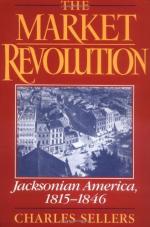
|
| Name: _________________________ | Period: ___________________ |
This quiz consists of 5 multiple choice and 5 short answer questions through Chapter 13, The Great Contradiction.
Multiple Choice Questions
1. What aspect of slavery offended liberal capitalist bourgeois morality, in Sellers' account?
(a) Planters' profits.
(b) Servitude.
(c) Racism.
(d) Miscegenation.
2. What does Sellers say happened to new workers in Jackson's America?
(a) They were organized in unions.
(b) They moved west.
(c) They were "deskilled."
(d) They were sent back to Europe.
3. What was the result of the cotton industry's expansion?
(a) Lower prices for slaves.
(b) Lower wages for wage laborers.
(c) Lower prices for finished cotton goods.
(d) More unrest in northern factories.
4. Which of these was NOT a problem Andrew Jackson saw in the National Bank?
(a) Creating booms and busts.
(b) Putting the nation into debt.
(c) Encouraging the concentration of wealth.
(d) Depreciating assets.
5. What does Sellers say Jackson learned from his mother as a child?
(a) Do the right thing.
(b) Get ahead.
(c) Never tell a lie.
(d) Defend yourself.
Short Answer Questions
1. How did the desire of Northern manufacturers to restrict imports affect Southern planters?
2. In what case was expansionism restrained?
3. What did the Speaker of the House under James Monroe advocate?
4. What condition was the South in by the mid-1820s?
5. What was DeWitt Clinton's role in the Republican party?
|
This section contains 226 words (approx. 1 page at 300 words per page) |

|




